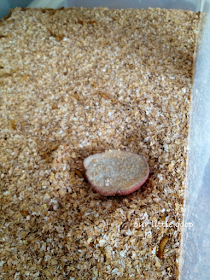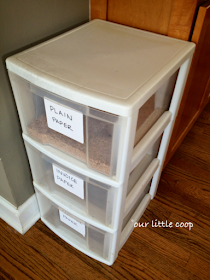As we all know, meal worms are a great feed supplement for all poultry flocks, and they LOVE them. Thanks to companies like Happy Hen Treats they are easy to purchase and simple to feed to our chickens, ducks and quail. Over time, depending on how often you like to give your birds meal worms, it can indeed get quite pricey. In a time where the "name of the game" is to spend as little as possible and be more self sufficient, one finds themselves looking for alternatives to buying certain things. Although there is an initial investment to meal worm farming, the pay off is quite nice and in some cases you can even make money by selling your worms.
 |
| Meal worm farm field. Substrate used is wheat bran. |
I recently started up my own meal worm farm about 2 weeks ago after much research and consulting with several "professionals". Like anything else, the more people you ask the more different answers you will receive. What I did was to start simple and combined bits and pieces from each persons point of view.
 |
| The meal worm farm is the cheapest farm you can possibly buy. |
The first thing you will need to start farming your own meal worms is obviously the farm itself. I am using a plastic 3 drawer organizer I had left over from our office which had been used to store paper products in. Since we no longer use paper, it was the perfect item to repurpose. The reason for 3 drawers is because you should separate the worms as they go through their life cycles from worm to pupa to beetle and back again. All of the drawers will need a layer approximately 2 inches deep and also some sort of moisture for the worms to drink from usually just in the form of a cut potato or carrot. Since these worms are going to be a food source for our hens and our family eats their eggs, I didn't skimp on the substrate which the worms feed from. In my farm I used an all natural wheat bran at about $2 per box with each drawer using about 2 boxes. You can also use non - instant oat meal if you prefer.
 |
| Feed them right by using a good substrate. |
The first drawer of my meal worm farm contains the worms themselves. This initial purchase of worms can either be bought in bulk from an online distributor or through your local pet store. You will want to start with about 500-2000 worms if you will be feeding your birds right from your farm. Stay away from the "super worms" and "giant meal worms" as these are somehow treated to prevent them from further developing.
The second drawer of my meal worm farm will contain the pupa I gather from my first drawer. These are easy to distinguish because you will most likely find them on the top of the substrate, motionless, and will be a creamy white color. Their color will slowly turn to brown during its pupation which may take anywhere from three days up to one month.
The third drawer of my meal worm farm will contain the beetles which "hatch" from the pupa. The Tenebrio molter, or flour beetles, are then left in this drawer on the same substrate as in the other two, where they will eventually lay up to three hundred eggs each! As these eggs hatch into worms and the worms get large enough for me to strain out, they will be placed into the first drawer and the cycle will begin all over again.
Mealworm Nutritional Information:
Fat 27.2%, Protein 49.6%, Carbohydrates 6.9 grams/100, Calories 471 calories/100 grams
Happy Farming!
(Purchase your supplies below with these great deals!)


At what temperature range does the meal warm farm need to be maintained?
ReplyDeleteI don't think they are really that picky but have been told the best temperature for keeping the meal worms at is 75F for the most productivity.
DeleteThis makes me want to empty my organizer in my office right now!
ReplyDeleteHaha DO it!!
DeleteI have looked into farming meal worms over the last few weeks. Youtube has several videos on raising meal worms but the video quality is awful. The best one shows three bins on a table (with BAD lighting) and gives instructions on the life cycle of the worms, add veggies for water and says to move them every two weeks. Other than that, it is not a complicated ordeal.
ReplyDeleteMy local pet shop made me choke yesterday. $4.00 for 75 worms; 5 dollars for a hundred live worms. The YT videos spoke of hundreds for 9 dollars. Yikes! I do believe an internet order is called for.
Yes. Ive contacted a couple distributors hoping to get a hold of one that will work with us. They will probably respond on Monday.
DeleteWould you keep us posted on the length of time you can keep the oats ir bran before you need to recycle it? I was wondering about the smell also. Where do you keep your farm? Nothing will escape will it? I was wondering if it attracts flies, etc.? Thanks for educating us.
ReplyDeleteSo what kind of numbers are we talking here? How many chickens do you support on this system? How often and how much do you give them?
ReplyDeleteHow do you keep the beetles from escaping?
ReplyDeleteI haven't had any escape using this system.
DeleteHas there been an update post about mealworm farming? I'm curious how it worked out. :)
ReplyDeleteThe meal worm farm worked out very well... provided you and whatever you are feeding have ample amounts of patience! For our needs, purchasing worms in bulk through an online supplier works out well.
DeleteHow do you get the pupa out to the second tray?
ReplyDeleteAnkara
ReplyDeleteAntalya
istanbul
Ordu
izmir
XQUO8
maraş evden eve nakliyat
ReplyDeletemaraş evden eve nakliyat
izmir evden eve nakliyat
konya evden eve nakliyat
erzurum evden eve nakliyat
FAVZ3D
https://istanbulolala.biz/
ReplyDeleteFQ6MPE
karabük evden eve nakliyat
ReplyDeletebartın evden eve nakliyat
maraş evden eve nakliyat
mersin evden eve nakliyat
aksaray evden eve nakliyat
50M
79561
ReplyDeleteÇerkezköy Yol Yardım
İzmir Lojistik
Bolu Evden Eve Nakliyat
Bitlis Şehirler Arası Nakliyat
Ankara Fayans Ustası
Çorum Parça Eşya Taşıma
Altındağ Parke Ustası
Edirne Parça Eşya Taşıma
Çanakkale Lojistik
BA54F
ReplyDeleteDenizli Parça Eşya Taşıma
Ünye Asma Tavan
Konya Lojistik
Balıkesir Şehir İçi Nakliyat
Nevşehir Parça Eşya Taşıma
Kırklareli Lojistik
Kayseri Evden Eve Nakliyat
Karapürçek Parke Ustası
Hatay Parça Eşya Taşıma
08133
ReplyDeleteKarapürçek Fayans Ustası
Sincan Boya Ustası
Kastamonu Evden Eve Nakliyat
Ünye Boya Ustası
Binance Referans Kodu
Nevşehir Evden Eve Nakliyat
Kocaeli Evden Eve Nakliyat
Isparta Evden Eve Nakliyat
Tekirdağ Parke Ustası
CE5B9
ReplyDeleteÜnye Çatı Ustası
Altındağ Boya Ustası
Malatya Parça Eşya Taşıma
Aksaray Evden Eve Nakliyat
Ankara Asansör Tamiri
Karaman Şehirler Arası Nakliyat
Eryaman Boya Ustası
buy sarms
Bolu Şehirler Arası Nakliyat
FDEAE
ReplyDeleteAnkara Parke Ustası
Ordu Evden Eve Nakliyat
Tekirdağ Parke Ustası
Tekirdağ Cam Balkon
Yozgat Evden Eve Nakliyat
Manisa Evden Eve Nakliyat
Siirt Evden Eve Nakliyat
Pursaklar Fayans Ustası
Batıkent Parke Ustası
F375F
ReplyDeleteBitfinex Güvenilir mi
Adıyaman Evden Eve Nakliyat
Adana Evden Eve Nakliyat
Ünye Oto Boya
Çerkezköy Televizyon Tamircisi
Bilecik Evden Eve Nakliyat
Osmaniye Evden Eve Nakliyat
Silivri Evden Eve Nakliyat
Ünye Çatı Ustası
FE09C
ReplyDeleteMamak Boya Ustası
Mamak Parke Ustası
Aksaray Evden Eve Nakliyat
Antep Evden Eve Nakliyat
Gölbaşı Fayans Ustası
Poloniex Güvenilir mi
Ünye Koltuk Kaplama
AAX Güvenilir mi
Bitlis Evden Eve Nakliyat
11988
ReplyDeleteAAX Güvenilir mi
Silivri Boya Ustası
Tekirdağ Parke Ustası
Burdur Evden Eve Nakliyat
Çerkezköy Motor Ustası
Etlik Boya Ustası
Ankara Fayans Ustası
Düzce Evden Eve Nakliyat
Çerkezköy Çekici
FA15A
ReplyDeleteresimli Magnet
77479
ReplyDeletesamsun ücretsiz sohbet odaları
diyarbakır görüntülü sohbet uygulama
muğla bedava görüntülü sohbet
canlı sohbet odaları
kırıkkale parasız sohbet
nevşehir kızlarla canlı sohbet
tunceli ücretsiz sohbet uygulamaları
ardahan yabancı canlı sohbet
elazığ sesli görüntülü sohbet
FB949
ReplyDeletetelefonda sohbet
denizli telefonda rastgele sohbet
aydın goruntulu sohbet
manisa parasız sohbet
malatya en iyi rastgele görüntülü sohbet
Adıyaman Ücretsiz Sohbet Siteleri
Aksaray Bedava Sohbet Uygulamaları
Çanakkale Sesli Sohbet Uygulamaları
tokat görüntülü sohbet kadınlarla
AB0E5
ReplyDeleteSakarya Goruntulu Sohbet
muş en iyi sesli sohbet uygulamaları
muhabbet sohbet
elazığ sesli sohbet odası
trabzon ücretsiz sohbet odaları
Artvin Mobil Sohbet Bedava
Sinop Canlı Görüntülü Sohbet Siteleri
parasız görüntülü sohbet
random görüntülü sohbet
C69F1
ReplyDeleteBitcoin Nasıl Alınır
Tiktok Takipçi Satın Al
Kripto Para Nasıl Çıkarılır
Binance Referans Kodu
Kripto Para Kazanma Siteleri
Paribu Borsası Güvenilir mi
Onlyfans Beğeni Hilesi
Kwai Beğeni Satın Al
Jns Coin Hangi Borsada
91A32
ReplyDeletebiberiye sabunu
kucoin
papaya
katran sabunu
toptan mum
deve sütü sabunu
probit
bitget
btcturk
D1411
ReplyDeletekripto telegram grupları
kripto para haram mı
referans kimliği nedir
güvenilir kripto para siteleri
okex
huobi
türk kripto telegram grupları
mexc
binance
367A2
ReplyDelete----
----
----
----
----
----
----
matadorbet
----
CG NCGHYNJ
ReplyDeleteشركة مكافحة حشرات
شركة صيانة افران بمكة CexRW6d1pu
ReplyDeleteشركة تسليك مجاري بخميس مشيط tj2OfcGV9a
ReplyDeleteشركة تركيب طارد الحمام بخميس مشيط vOMqApi8GQ
ReplyDeleteشركة مكافحة حشرات بالقطيف hIG4ttnw9L
ReplyDeleteشركة تسليك مجاري بالاحساء ew8Eb123Cx
ReplyDeleteشركة مكافحة الحشرات بالاحساء hitIl7Qq3i
ReplyDeleteشركة تنظيف سجاد بالاحساء BgAaiw3iCi
ReplyDeleteشركة تنظيف موكيت بجازان DewXOMxFG6
ReplyDeleteشركة عزل اسطح بالجبيل YZvifdw6gs
ReplyDelete21FE413D38
ReplyDeletetiktok takipçi satın al
5E77603FE8
ReplyDeletebot takipçi satın al
Sıra Bulucu
Coin Kazan
Whiteout Survival Hediye Kodu
War Robots Hediye Kodu
Osm Promosyon Kodu
Total Football Hediye Kodu
101 Okey Vip Hediye Kodu
Lords Mobile Promosyon Kodu
CD04EE9C53
ReplyDeleteyabancı takipçi
Avast Etkinleştirme Kodu
Hay Day Elmas Kodu
Hay Day Elmas Kodu
Free Fire Elmas Kodu
MFF Kupon Kodu
3D Car Parking Para Kodu
Zula Hediye Kodu
M3u Listesi
شركة تنظيف موكيت بالقطيف
ReplyDeletedqm2W9VaoR
شركة تركيب كاميرات مراقبة بجازان FpajFjV35L
ReplyDeleteعزل أسطح القطيف
ReplyDeleteXRSXOSHkmp
A0DA1565E4
ReplyDeletetwitter yabancı takipçi
beğeni satın al
instagram takipçi
takipçi paketi
takipçi paketi
تنظيف خزانات القصيم
ReplyDeletew2f9wRIZcx